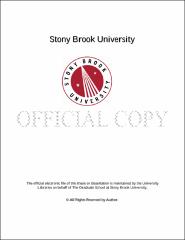| dc.identifier.uri | http://hdl.handle.net/11401/76276 | |
| dc.description.sponsorship | This work is sponsored by the Stony Brook University Graduate School in compliance with the requirements for completion of degree. | en_US |
| dc.format | Monograph | |
| dc.format.medium | Electronic Resource | en_US |
| dc.language.iso | en_US | |
| dc.publisher | The Graduate School, Stony Brook University: Stony Brook, NY. | |
| dc.type | Dissertation | |
| dcterms.abstract | Recent developments in next generation DNA sequencing and optical restriction mapping involve manipulation of DNA molecules on surfaces. Here we propose a novel method that can control the adsorbed DNA density on polymer surfaces by applying an electric field. The efficiency of deposition was optimized with respect to DNA concentration in solution, electric field type and electric field strength. Enhancement of adsorption density of greater than twenty-fold was found. In addition, DNA molecules are fragmented on a polymer surface by soft lithography. Several experimental conditions have been tested to optimize the polydimethylsiloxane (PDMS) stamp fabrication and DNA cutting method. Fragmented DNA strands of 3.5μm in length can be fabricated over a large area (2cm by 5cm) in one single cutting. The mechanism of DNA cutting behind this method has been discussed as well. This method can potentially improve current sequencing techniques in both efficiency and sensitivity. Finally, DNA molecules were then deposited and stretched on a flexible PDMS substrate. Incident light polarization was varied and fluorescence emission intensity was measured as a function of polarization angle and degree of stretching of the DNA. The stretching and breakage properties of lambda DNA on the PDMS substrate were determined. The amount of stretching before breakage occurred was found to be up to 50% relative to the as-deposited length. | |
| dcterms.abstract | Recent developments in next generation DNA sequencing and optical restriction mapping involve manipulation of DNA molecules on surfaces. Here we propose a novel method that can control the adsorbed DNA density on polymer surfaces by applying an electric field. The efficiency of deposition was optimized with respect to DNA concentration in solution, electric field type and electric field strength. Enhancement of adsorption density of greater than twenty-fold was found. In addition, DNA molecules are fragmented on a polymer surface by soft lithography. Several experimental conditions have been tested to optimize the polydimethylsiloxane (PDMS) stamp fabrication and DNA cutting method. Fragmented DNA strands of 3.5μm in length can be fabricated over a large area (2cm by 5cm) in one single cutting. The mechanism of DNA cutting behind this method has been discussed as well. This method can potentially improve current sequencing techniques in both efficiency and sensitivity. Finally, DNA molecules were then deposited and stretched on a flexible PDMS substrate. Incident light polarization was varied and fluorescence emission intensity was measured as a function of polarization angle and degree of stretching of the DNA. The stretching and breakage properties of lambda DNA on the PDMS substrate were determined. The amount of stretching before breakage occurred was found to be up to 50% relative to the as-deposited length. | |
| dcterms.available | 2017-09-20T16:49:54Z | |
| dcterms.contributor | Rafailovich, Miriam | en_US |
| dcterms.contributor | Sokolov, Jonathan | en_US |
| dcterms.contributor | Halada, Gary | en_US |
| dcterms.contributor | Lu, Ming. | en_US |
| dcterms.creator | Zhu, Ke | |
| dcterms.dateAccepted | 2017-09-20T16:49:54Z | |
| dcterms.dateSubmitted | 2017-09-20T16:49:54Z | |
| dcterms.description | Department of Materials Science and Engineering | en_US |
| dcterms.extent | 102 pg. | en_US |
| dcterms.format | Application/PDF | en_US |
| dcterms.format | Monograph | |
| dcterms.identifier | http://hdl.handle.net/11401/76276 | |
| dcterms.issued | 2016-12-01 | |
| dcterms.language | en_US | |
| dcterms.provenance | Made available in DSpace on 2017-09-20T16:49:54Z (GMT). No. of bitstreams: 1
Zhu_grad.sunysb_0771E_12991.pdf: 9192800 bytes, checksum: d21c28ebfeb5a4376ebb469d54b28e72 (MD5)
Previous issue date: 1 | en |
| dcterms.publisher | The Graduate School, Stony Brook University: Stony Brook, NY. | |
| dcterms.subject | Materials Science -- Biophysics | |
| dcterms.subject | DNA Cutting, DNA sequencing, DNA stretching, Molecular Combing, Soft Lithography | |
| dcterms.title | Manipulation of DNA at Polymer Surfaces: Electric-Field Controlled Adsorption, Patterned Cutting and Stretching | |
| dcterms.type | Dissertation | |

